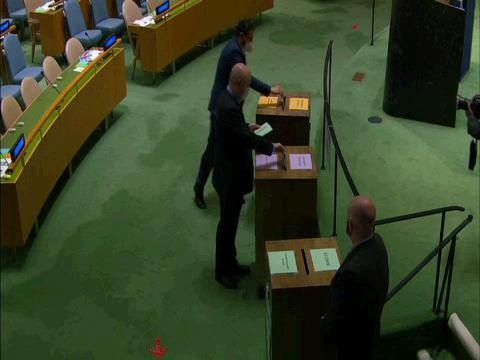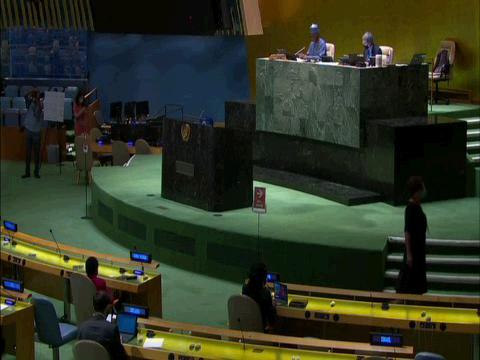General Assembly
23rd Plenary Meeting of General Assembly 74th Session
While many Member States praised the Human Rights Council for its inclusivity and focus on abuses occurring around the world, others expressed concern over its membership selection process, as the General Assembly took up the intergovernmental body’s annual report today.
Presenting its annual report (document A/74/53), Human Rights Council President Coly Seck (Senegal) said the body has remained faithful to the mandate entrusted to it by the General Assembly “to promote universal respect and the defence of all human rights and fundamental freedoms for all without distinction and in a fair and equitable manner”.
He provided an overview of activities and measures adopted at its three regular sessions over the past year. The Council is uniquely inclusive among United Nations bodies, soliciting the active participation of civil society alongside countries without member status in Geneva, including small island developing States. The Council’s work included technical assistance and capacity‑building, particularly with States such as Cambodia and Georgia, and discussions to promote sharing good practices and technical cooperation.
Citing several achievements, he said Council resolutions provided the Assembly with a range of recommendations, including with regard to reports from the Independent International Commission of Inquiry on the Syrian Arab Republic to the Security Council, and the issues of racism, equal remuneration of work of equal value, and Rohingya Muslims and other minorities in Myanmar, Burundi and Yemen. At the same time, the innovative universal periodic review process continues to ensure the effective implementation of human rights.
He regretted that on several occasions there have been allegations of acts of reprisal and intimidation against advocates and human rights defenders who have cooperated with the Council. Such actions are unacceptable, he emphasized.
The General Assembly President, Tijjani Muhammad‑Bande (Nigeria), said that the Council works as a fundamental element of the human rights system to actualize a shared vision for a better world. He observed that that body’s report aligns with the priorities he established for the seventy‑fifth session of the General Assembly, including education, inclusion, poverty eradication and climate action.
Numerous delegations commended the Human Rights Council’s work, with the European Union’s representative pointing to its prolificity. He observed that, during this reporting period, the Council adopted 88 resolutions, 42 universal periodic review decisions and two presidential statements. “These numbers reflect the importance that countries from all regions of the world attribute to its work,” he said.
The representative from Ukraine said Sudan’s transformation into a democratic nation can serve as a success story for the Council. He added that his country appreciates the body’s attention paid to the invasion of the Crimea, and other abuses, by the Russian Federation.
Numerous delegations shared the concerns of the Human Rights Council President that, in some cases, individuals who participated with the body were subject to reprisals and intimidation. The representative of the United States said his delegation has “grave concerns” about the welfare of these individuals. Likewise, the representative of Georgia said that all States must take the necessary measures to prevent these violations.
Several other representatives, including those from Syria and Iran, suggested that the Council’s selectivity in condemning countries’ human rights violations undermines its overall credibility. Conversely, Venezuela pointed to its election to the Council as evidence that the international community rejects the spurious allegations against the country by the United States and its European allies. Some States said that the Council’s effectiveness has been inhibited by its inability to access certain countries charged with human rights abuses. Bangladesh expressed regret that neither the Special Rapporteur on the human rights situation in Myanmar nor the United Nations Independent International Fact‑Finding Mission have been granted access to that country.
Also speaking today were representatives of Cuba, Belarus, Qatar, Australia, Kuwait, Liechtenstein, Eritrea, Russian Federation, Maldives, Switzerland, India, Norway, Slovenia, Senegal, Iceland, El Salvador, Costa Rica, Oman and Argentina. The representative of China spoke in exercise of the right of reply.
The Assembly will reconvene at 10 a.m. on Monday, 4 November, to take up the report of the International Criminal Court.
For further details please see SOURCE below.
MEETINGS COVERAGE

